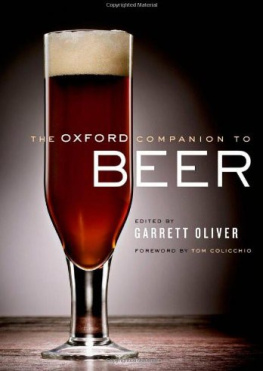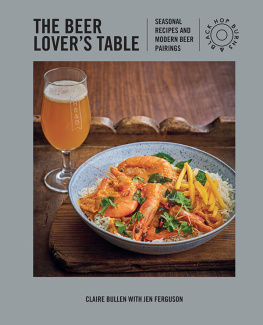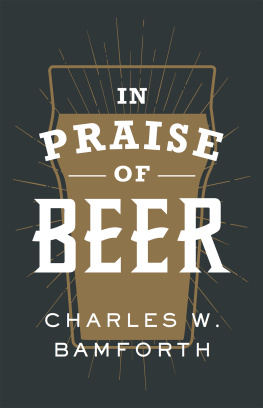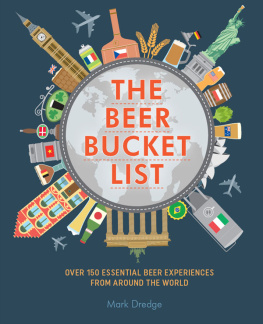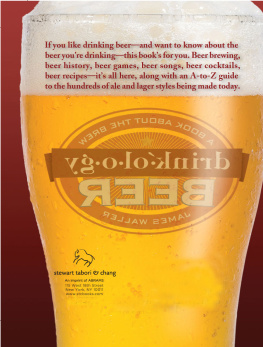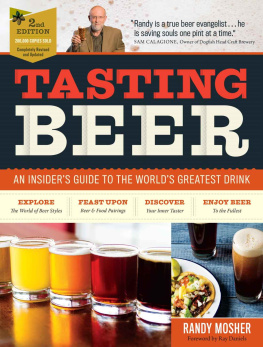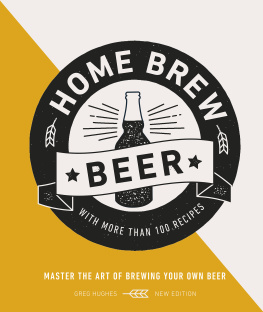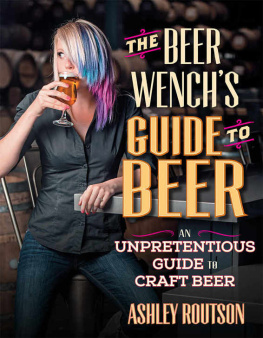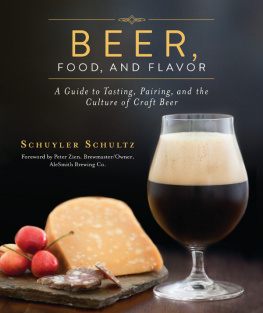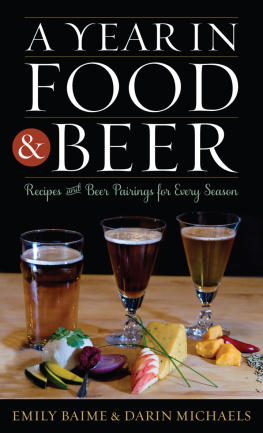It seems impossible to me now, but its been twenty years since I discovered the joys of real beer. It was a discovery that completely changed my life. With college degree in one hand and duffel bag in the other, I was fresh off a plane to London from New York, and I was feeling a bit shaky. Id been overseas only once before, and now I planned to live in London for an entire year. It was a cool September day, and despite the fact that it was still morning, my situation seemed to call for a beer. I made my way to a rundown, shaggy-looking place tucked behind Victoria Station, where I was sure a beer would be waiting for me. As far as I was concerned, the place had charmcarpeting, plush chairs, beer, and a barkeep with a British accent. What was not to like? I ordered a pint. With two long pulls of the tap, liquid flowed into the glass. The barkeep handed me something that looked like a dimpled fishbowl with a handle, brimming with maple syrup. I paid him with the Monopoly money Id picked up at the airport and moved to stretch out on a couch.
The first sip was odd. This beer hardly had a head, just a loose lace of bubbles around the rim of the glass. As I started to drink it, I wondered, What is this stuff? The bitterness ran across my tongue, assisted by only the faintest prickle of carbonation. Then it exploded in layers of flavorhay, earth, newly mowed grass, orange marmalade, and baking bread. It wasnt even coldin fact, it was barely cool. Each sip seemed to reveal something newa whiff of sea air, a different flower or fruit. Did I like it? I wasnt sure. But it was so interesting that I couldnt stop drinking it. Then my glass was empty. The beer was all gone, and I missed it already. With that, I stepped outside into the cool mist and went to look for someplace to live.
Little did I know that my beer odyssey had begun. As fall turned into winter, and winter into a foggy, damp spring, I sampled hundreds of pints of what the British call real ale. Real ale and the homeyness of the pub were my personal windows into Britain and what made it a different place from the States. Beer was always the first topic of conversation in the pub, and we chose our pubs for how well they kept their casks. The pints spot-on tonight meant we were staying for the evening, and a round of tired pints meant we were out the door. Bad music was one thingbad pints were intolerable.
After my year in England, I bought a European rail pass. Through my travels I discovered people who really understood how to live. Pleasure wasnt just a reward for a job well done. Pleasure was nothing less than the goal of a life well lived. Wherever people were laughing and eating and drinking, I found great beer and great food togetherit never occurred to me that anyone would want to separate them.
When I got to Paris, I imagined that the city would be full of wine snobs, but far from it. The Parisians were drinking earthy, spicy Jenlain farmhouse ale with their garlicky Toulouse sausages. The beer in England had been terrific, but the foodwell, lets just say it had a long way to go. Those French sausages were the best food Id had in months, exploding with hot garlic and the unmistakable flavor of great pork. The yeasty, anise-like flavor of the beer blended perfectly; it was impossible to imagine eating these sausages with anything else. As an added bonus for me, the French beers matched their great cheeses. Paris was expensive and I didnt have much money, but a baguette and a hunk of cheese made an affordable meal. Accompanied by farmhouse ale, these humble meals were rich in the simple pleasures of life in France.
In beautiful Bruges, the Belgian Venice of the north, everyone I met cooked with beer. In Belgium, great beer is everywhere and in everything. Naturally, I fell in love with the place. Chicken waterzooia stewed chicken cooked in a beer-based stockwas as ubiquitous in Bruges as bagels are in New York. It was full of onions and bay leaves, shredded carrot and cabbage, a touch of cream, and the distinctive flavor of beer. Underneath it all, a whole chicken leg, the meat falling from the bone. The Belgian beer was an even bigger surprise. Gueuze beer, pale and hazy, was tart, acidic, and as funky as Roquefort cheese. Flavors of yeast and hay, lemon peels, and damp wool mingled with the sharpness of the onions and married the beer in the stockthe combination was wonderful. The locals nodded their approval and told me that this was the only beer in the world still brewed the way it had been thousands of years ago. No yeast was added, they saidthe fermentation started by itself. In Pieter Brueghel the Elders paintings, they said, everyone was drinking gueuze. Everywhere I looked, I could see the intense pride people had in this prehistoric throwback of a beer.
The people of Amsterdam were relaxed and breezy. At the same time, I detected a faint smugness; but then, if I lived on a beautiful canal and had a barge with a living room set on the deck, I would feel smug, too. Not only was the beer cloudy, it was the palest beer Id ever seen. I ordered one at a canalside caf. The beer was called witbier, meaning white beer, and tasted like summer. It was bright and citrusy, with a spicy aroma and an amazingly refreshing, slightly tart spritz on the palate. My sandwich came to the table, an open-faced ciabatta roll topped with grilled salmon and Gouda cheese. The beers bright acidity was like a squeeze of lemon on the salmon and sliced right through the cheese. The combination filled my sensesit was so magical that I was almost overwhelmed by the interplay of flavors. The beer, the salmon, and the sunshine bouncing off the water I started to seriously consider moving to Amsterdam.
Instead, however, I came back to the States. And there was nothing to drink.
Store shelves had been stocked with only a few brands of identical mass-market American yellow fizz before I left for Europe, and they were still stocked with the same beers. But I had changedI couldnt drink this stuff anymore. What was I going to do? I did the only thing I could think ofI started to brew real beer in my kitchen. It was the first step onto a long, slippery slope. Eventually, I lost my grip. My college degree said that I was a filmmaker, but I was now destined to become a brewmaster. Ive never looked back.
My problem with returning to the United States wasnt just the beer, though it was everything. Back then, our supermarket shelves were dominated by frozen vegetables, Wonder Bread, pasteurized processed cheese food, and freeze-dried coffee. It was a pretty bleak scene for anyone who wanted to eat well.
Well, the dark ages are finally over. Salsa has eclipsed ketchup as Americas favorite condiment, and those same supermarket shelves are packed with a beguiling variety of breads, olive oils, artisanal cheeses, aged hams, fresh vegetables and herbs, spices, real coffee, chili peppers, and flavorful traditionally brewed beers. When it comes to cuisine, the United States has quickly become the most exciting place in the world.
Traditional beer is the new star with the international cuisines that we are all eating today. Real beer can do amazing things with food, and it goes places where wine cannot go. Dont get me wrongI love wine. Ive spent some of the most pleasurable days of my life in Piemontese wine country, sipping terrific old Barolos over languorous four-hour lunches. Ive marveled at magnificently aromatic German Rieslings. Wine is wonderful. But lets be honestit cant do everything.


